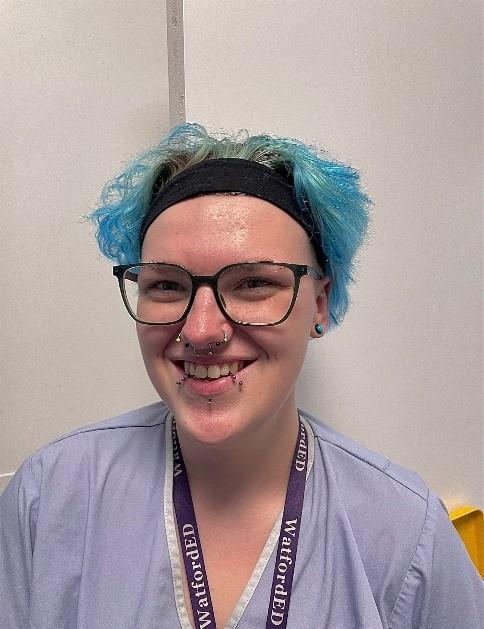You are here
Health care support workers week: Emily-Jane's story
17 October 2023
 Emily-Jane Picton is a health care support worker and registered nursing degree apprentice in adult accident and emergency. She currently works at West Hertfordshire Teaching Hospitals NHS Trust.
Emily-Jane Picton is a health care support worker and registered nursing degree apprentice in adult accident and emergency. She currently works at West Hertfordshire Teaching Hospitals NHS Trust.
What inspired you to join the NHS?
I was 18 and had no previous experience in the care sector at all. All I knew was that I wanted to look after adults and work within a hospital.
How did you get your job?
I worked as a waitress and studied for a Health and Social Care Level 3 Extended Diploma. As I was finishing the first lock down started so the last couple of months were completed online.
After completing my course I began to work for Public Health England, supporting a COVID study within schools. This helped me develop my communication and ‘people skills.
When I began looking for jobs I knew I wanted a role within a hospital with the opportunity to do a nursing apprenticeship. I found that West Hertfordshire Trust were advertising HCSW roles at Watford general hospital that offered this so applied.
During my interview I mentioned that I wanted to work in the A&E department. I already had my care certificate, so I only had to complete a booklet to show that I was competent and had the necessary knowledge to begin work.
I started my job as a HCSW in A&E in December 2020.
What does your role involve?
Working in A&E my role is very different to a HCSW on the ward. In A&E there are many different responsibilities and duties that I have including:
- Taking patients’ bloods
- Putting cannulas into patients (allowing access to patient veins)
- Performing ECGs (checking heart activity)
- Plastering
- Taking/ transporting patients to the ward
- Taking patients to X-ray, CT and MRI scans
- Wound care
- Personal care for example, changing patient's pads, cleaning patient's beds, getting them something to eat and drink, helping them go to the toilet.
- Catheterisation (to drain the bladder of urine)
- Taking observations
- Escalating to doctors and nurses about patients
- Urine and pregnancy tests and sending samples
- Documentation
Being a HCSW in A&E has allowed me the opportunity to gain all these skills and the required knowledge to work within a hospital.
What has helped develop your career?
The Health and Social Care Level 3 Extended Diploma helped me massively in having the knowledge to care for patients and understanding of conditions.
Over three years working in A&E I have gained many skills, competencies and knowledge that help me in my apprenticeship to become a nurse.
How are you supported by your Trust during your career progression?
When I started, I knew I wanted to become a nurse by doing an apprenticeship. I was considering doing the nursing associate apprenticeship, however I was supported to apply for the registered nursing degree apprenticeship (RNDA).
My managers have helped me massively by preparing me or the course. The department supports my development to be competent in many skills that people might think are nurses’ responsibilities. This includes venepuncture (drawing blood from a vein with a needle) and cannulation (allowing access to a vein for taking blood and administering fluids or medication).
After I started the nurse apprenticeship course my managers were very understanding and helped with my rota and learning when on shift. The education team at the trust has been amazing helping me to gain knowledge and skills on the job.
The trust has made it easy, developing me from brand new in A&E, to an experienced HCSW to where I am now as a HCSW and a RNDA student.
What would you say to a HCSW looking to take the next step?
As someone with dyslexia and who has recently been diagnosed with ADHD, always believe you can achieve your goals. There may be some barriers that you face when completing certain tasks, and you may need to take a few extra steps but that doesn’t mean you cannot complete it.
If you believe you can do it and you want it for yourself then push yourself and take that step.
However, don’t feel pressured to progress if you don’t believe you are ready or don’t want to.
Do what makes you happy.
What would you say to someone considering a career in the NHS?
I would 100% recommend getting a career in the NHS. Don’t get me wrong, it can be very hard work and stressful at times, however it is a very rewarding and interesting job.
There are many different areas and jobs in the NHS, no matter what department or area you decide on you are making a difference and helping peoples’ lives.